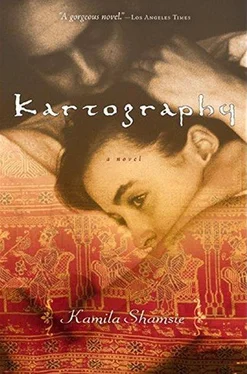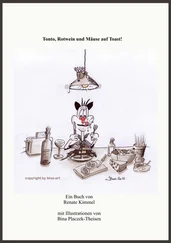Uncle Ali looked at the glass table in the centre of the room, with its vase overspilling with flowers, and frowned. ‘You don’t have nearly enough vases for that absurd amount of roses, do you?’
‘Who needs vases?’ My mother stood up, leaned outside and plucked a rose from the bucket. ‘We’ll make everyone do the tango.’ She held the rose up horizontally. ‘Like in Some Like It Hot .’ She snipped off the thorns with Aba’s pocketknife, and held the rose to Uncle Ali’s mouth. For a moment he continued glaring and then, snap, his teeth closed around the rose stem.
‘Olé!’ Karim and I shouted.
‘Duet, duet,’ Aunty Maheen said, and sat down next to my father. ‘One, two, three.’ With more regard for volume than tune, they started bashing out ‘Chopsticks’ on the organ, while Ami and Uncle Ali twirled around the room in dance, Uncle Ali’s feet nimbly avoiding the perils of dancing with a sari. The rose transferred itself from Uncle Ali’s mouth to my mother’s just as the tune ended, even though their cheeks didn’t ever quite touch as they danced.
‘Encore, encore,’ Karim said when they finished.
‘Absolutely not.’ Ami collapsed on the sofa and slumped against Aba’s shoulder. ‘I’m exhausted. You’re married to an old hag, Zaf.’ She tucked the rose behind my father’s ear.
‘I’ve got the old hag on my hands,’ Aba sang.
Aunty Maheen handed my mother the discarded thorns from the ashtray, and Ami jabbed Aba’s neck with them. Uncle Ali cheered her on.
My analysis of the photograph at Ali and Maheen’s wedding was clearly embarrassingly out of step with reality. I looked at my father’s hands. Perilously close to being ‘delicate ‘. Some other M, some other Z. Had to be. And if not, so what? Really, so what?
When the doorbell rang to signal the ‘actual guests’ had started to arrive, Ami said, ‘Oh, can’t we ignore them?’ and I held my breath, hoping she would. But, of course, even as she said that she was already walking towards the door, stopping first to check with Aunty Maheen that the rose exchange hadn’t smudged her lipstick.
Karim and I spent the next half-hour finding vases in different rooms and cupboards, and stuffing them full of roses. In between arranging roses, we did hors-d ‘œuvres twirls around the room, and by the time the first plate of devilled eggs was consumed everyone had arrived.
It wasn’t a particularly large party, as Karachi parties go. Fifty people, or thereabouts, almost all of whom had known my parents longer than I had. Designer shalwar-kameezes were still relatively new in Karachi, but I’m quite sure that by then we were past those ini tial days of designer fever, when every experiment possible with form had been tried on the generic shalwar-kameez, resulting in such absurdities as the dhoti shalwar and the butterfly shalwar — but, let’s admit it now, to those of us who had never known the swinging days of Karachi in the sixties there was an exuberance, a delight, in that revival of fashion right under the nose of the quasi-fundamentalist military government.
Though I don’t remember specifics about anyone’s attire at the party it’s safe to say that the person most expensively (though not necessarily most tastefully) dressed was Aunty Runty — Primo Ghutna, as Aunty Laila had once called her. Even while my parents had laughed at that remark, something in the way my father slid his glance around to me said that Aunty Laila was taking the easy option of parody. Easy to laugh at Aunty Runty; far harder to look at her and see, as my mother once said, ‘a woman from whom loveliness has fled’. You only had to look at her once, and then look at photographs of her before she married, to know the difference between beauty and loveliness. For Aunty Runty, as long as I can remember and I can remember only after her marriage, has as much beauty as money can buy, with more than a little help from her genes, but there is something blasted and hollow about that beauty. When I was at university, a friend showed me a videotape of thousands and thousands of lights strung beneath a velvet-black starry sky; I murmured, ‘Beautiful, that’s so beautiful,’ only to hear her say, ‘Those are the lights of refugee camps,’ and as I recoiled from the TV image I thought of Aunty Runty.
But back in 1987 refugees were still, to me, little more than a hassle that streamed across the Afghan border with guns and drugs, and Aunty Runty was a figure of fun as she sashayed her way across my parents’ living room and clutched my arm. ‘Raheenie, sweetie, why haven’t you wished me a happy, happy, ’87 yet?’
‘Nappy Yew Hear,’ I said, but it was lost on her.
‘Now, darling…’ Her voice lowered to a whisper. ‘Tell all about Asif’s brother’s elopement. You were there, no?’
‘Nothing to tell. Uncle Asif was very happy when he heard about it.’
Aunty Runty lowered her voice further. ‘It’s OK, you can trust me. Here…’ She fumbled in her bag and pulled out a tube of lipstick. ‘Boys will die for this colour. Take it, go on. Sign of friendship.’
I put my hands up and backed away. ‘No, really, thank you.’ I looked at the bright red stick that she was swivelling up and down before my eyes as though she intended to hypnotize me with it. ‘I’m telling the truth. I was with Uncle Asif when his brother called, and he put it on speaker-phone, so I heard everything, and, really, he was very happy. Planning celebration parties.’
Aunty Runty looked over my shoulder at the mirror and applied a layer of lipstick to her mouth. The previous layer was on the rim of a whisky glass, as was the layer before that and the one before that and the one before that. ‘Clever man, Asif,’ she said. ‘He knew we’d ask you what happened, so he put the call on speaker-phone and pretended he was happy.’ She popped the lipstick back in her bag and snapped the clasp closed.
‘Why shouldn’t he be happy?’ I couldn’t help asking.
‘The girl’s a Shi’a.’ When I looked confused, she added: ‘Asif’s Sunni.’
‘Yes, but Uncle Asif doesn’t seem religious.’
Aunty Runty laughed. ‘What’s that got to do with it? Everyone wants everyone in their family to marry same to same.’ She looked across at her husband, the ghastly Bunty. ‘And that doesn’t mean same tastes in movies and books, OK. Just how they look on paper. The background. Class, sect, ethnic group: that’s what a family looks at when considering who they are willing to be related to through marriage.’ For a moment I thought I saw something in her that allowed me to understand how she and my mother had ever been friends, and then it was gone, and she said, ‘Though, of course, that worked out for your parents.’ She inclined her head to where Ami stood with her hand on Aba’s shoulder, talking to Uncle Ali and Aunty Maheen. ‘And Maheen no longer seems to mind that your father didn’t want to marry her because she’s Bengali. Although, I have to say, I was appalled when I first heard the engagement was broken. I said to your father, she’s not even that dark, Zafar. Many people can’t even tell where she’s from.’
What an idiot, I thought. Does she really expect me to take her seriously?
‘Excuse me,’ I said. ‘I have to help Karim with the hors-d’œuvres.’
‘With Karim, you can’t tell at all. That he’s half-Bengali. Never guess it. But let’s see — if one day you decide your friend Karim is husband material, what will Daddy say to that?’
‘Daddy just wants me to be happy,’ I said, and left her to her whisky.
‘She’s such a bitch,’ I said, when I reached Karim.
‘Raheen!’
‘Well, she is. But I’m not going to tell you what she said, because it’ll make you sick.’ It was making me sick even though I knew it to be a lie. What prompted people to make up this kind of story? I looked around the room and, for a moment, for the first time, the room divided into two before my eyes, and in one group were people who were at the party because they were my parents’ friends, and in the other group were people who were there because they wanted to drink, and they wanted to be seen, and they wanted most of all not to have to sit at home with themselves.
Читать дальше












